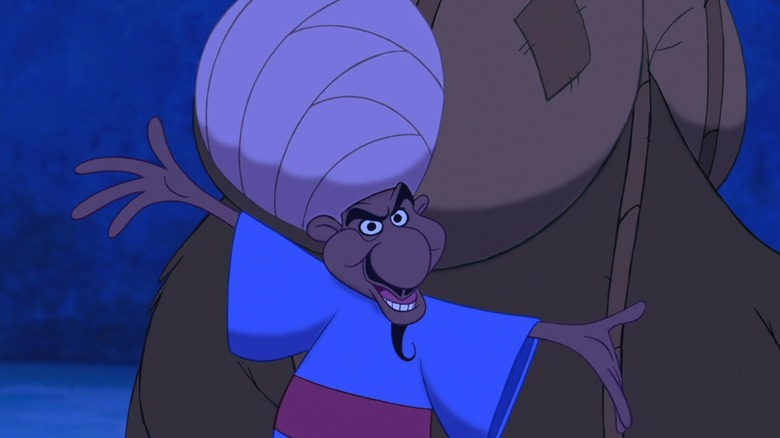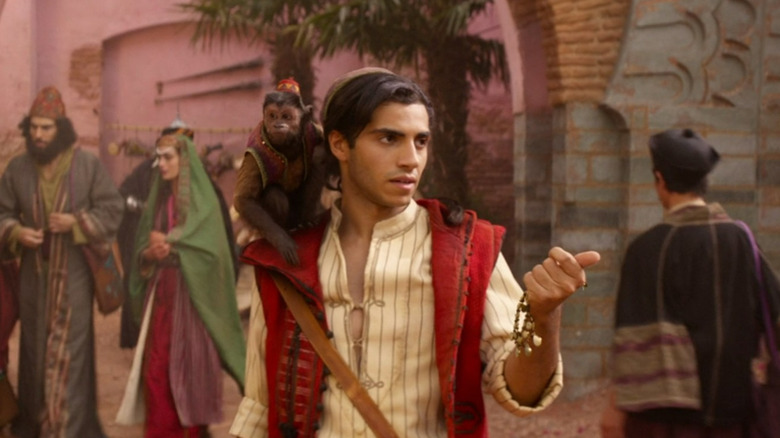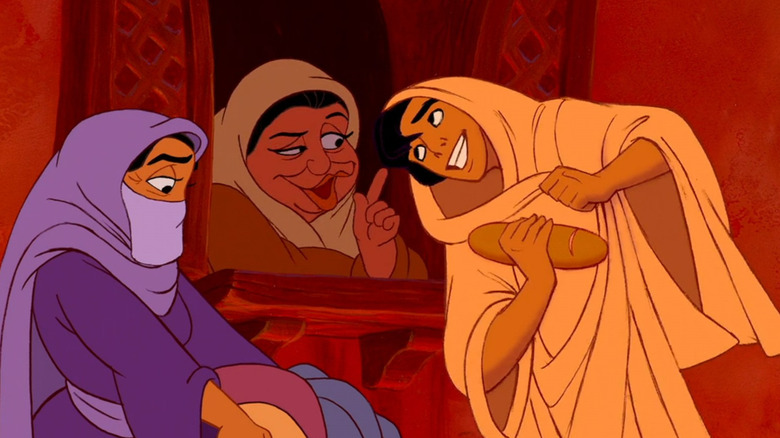Why Is Aladdin Offensive: How Stereotypes And Casting Caused Huge Backlash
Disney's "Aladdin" is a beloved animated musical from 1992, so beloved that it returned in 2019 for a live-action remake. And while only one of the two iterations tends to find itself on Top 10 lists, they both feature timeless tunes and relatable themes. But, unfortunately, the tale of love and lies kept more through lines than that because both versions are fraught with racial controversy.
The issue was, and is, that "Aladdin" uses racial stereotypes to depict the film's message. Upon the 1992 release of "Aladdin," the American-Arab Anti-Discrimination Committee wrote a statement in regard to the Anglicized features and accent of Aladdin (Scott Weinger and Brad Kane), who was modeled after Tom Cruise. In contrast, characters who are greedy or villainous, like Jafar (Jonathan Freeman), the guards, or the merchants are "dark-skinned, swarthy ... with Arabic accents and grotesque facial features."
In an opinion piece for the Los Angeles Times, Jack Shaheen, an American author who specializes in the dissection of racial stereotypes in media, wrote, "'Aladdin' is not an entertaining Arabian Nights fantasy as film critics would have us believe but rather a painful reminder to 3 million Americans of Arab heritage, as well as 300 million Arabs and others, that the abhorrent Arab stereotype is as ubiquitous as Aladdin's lamp." Shaheen went on to note that these fictional depictions have a strong connection to real-life events. "Sadly, repetitious and negative Arab images literally sustain adverse portraits across generations," he wrote.
The Aladdin remake might have learned the wrong lessons
It's worth mentioning that Disney attempted to assuage some of these concerns about harmful depictions of Middle Eastern peoples and cultures. In the original theatrical release of "Aladdin," the song "Arabian Nights" featured the line "Where they cut off your ear if they don't like your face" as a description of Agrabah, the fictional city at the heart of the film. Through lobbying, the line was altered for the physical release in 1993 to "Where it's flat and immense and the heat is intense." In this same vein, the original animation now features an extra advisory screen on Disney+.
For the 2019 remake, Disney benefited from hindsight and constructive criticism. Despite this, the studio managed to embroil itself in a viral controversy. The Hollywood Reporter was only one of many news sites that reported on Disney's vocal struggle to find the right leads. According to the studio, it was difficult to find a Middle Eastern or Indian individual who could successfully sing and dance the part. This rang false to listening ears in no small part thanks to the existence of Bollywood, which is almost drowning in talent that fits that exact bill of needs.
Lexi Alexander, an Academy Award-nominated director, found Disney's lack of success questionable. "Nobody in their right mind can state that it is impossible to find a young male South Asian or Middle-Eastern actor who can dance, sing and act, said Alexander. "It's a convenient system that insists actors-of-color need to be household names to be cast, while nobody wants to give them a break."
The harsh reality of media's current cycle of change
While not necessarily heartening, Daniel Newman, a professor of Arabic at Durham University, admitted that more recent depictions of Middle Eastern peoples and cultures are not what they once were. The problem is, though, that new stereotypes have replaced older ones. "Barring a few exceptions, what has happened is that one cliché has been replaced by another; from the scimitar-wielding lascivious Arab, we have gone to the bomb-wielding terrorist Arab," admitted Newman. "The pervading feeling is one of 'threat', based primarily – if not exclusively – on religion."
To better combat these images, Jack Shaheen made several pleas to Disney in his Los Angeles Times piece. "I'd ask the animators to add benevolent market-vendors and heroic guards who befriend Aladdin," he wrote, later adding that the animators should "respect Islam and [add] a humane character, Aladdin's mother, an Arab woman willing to sacrifice everything for her son's happiness."
Interestingly, while Aladdin's mother never made the cut in any version of the animated film, she became an integral aspect of the titular character's emotional journey in Broadway's stage adaptation of "Aladdin." No, she still isn't present, but Aladdin sings a beautiful song to her, nonetheless.
These changes, as well as those made for the 2019 live-action remake, are small. And they can never totally balance the truth of "Aladdin" being a Chinese myth adapted by European artists to share a Middle Eastern world. That might be difficult to reconcile with the joy that "A Whole New World" provides, or even with the immortal comic stylings of the late Robin Williams, but it's an aspect of "Aladdin" that will continue to deserve observation as long as art is intended to exist on a global, or even personal, scale.


